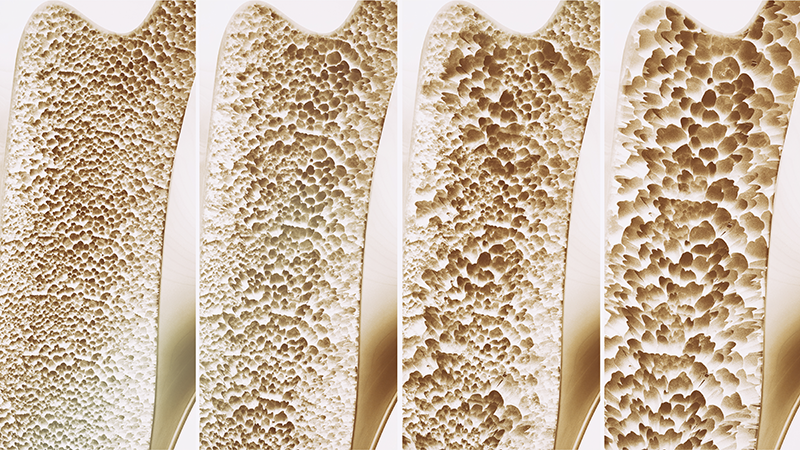In this recent study, researchers compared three IGF-1 polymorphisms in postmenopausal Asian women and investigated their potential link to osteoporosis.

The Trending With Impact series highlights Aging publications (listed as “Aging (Albany NY)” by Medline/PubMed and “Aging-US” by Web of Science) that attract higher visibility among readers around the world online, in the news, and on social media—beyond normal readership levels. Look for future science news about the latest trending publications here, and at Aging-US.com.
—
Osteoporosis is characterized by the loss of bone density and an increased risk of fractures. This serious health condition is a major public health concern, particularly among older women. According to the National Osteoporosis Foundation, approximately 80% of the estimated 10 million Americans with osteoporosis are women. Additionally, roughly one in two women over the age of 50 will break a bone due to osteoporosis.
“Osteoporosis (OP) is prevalent in postmenopausal women. Several studies investigated the association between IGF-1 polymorphisms and OP among postmenopausal females with conflicting outcomes.”
While the main risk factor for osteoporosis is undeniably aging, the causes of osteoporosis are more complex—involving a combination of genetic and environmental factors. The insulin-like growth factor 1 (IGF-1) gene plays a critical role in bone growth and development, and previous studies have suggested that variations in this gene may be associated with osteoporosis. Some genetic variants have been found to be associated with decreased IGF-1 levels, which may contribute to the development of osteoporosis.
In a recent study, researchers Sui-Lung Su, Yung-Hsun Huang, Yu-Hsuan Chen, Pi-Shao Ko, Wen Su, Chih-Chien Wang, and Meng-Chang Lee from the Tri-Service General Hospital and National Defense Medical Center in Taipei, Taiwan, explored the relationship between IGF-1 polymorphisms rs35767, rs2288377 and rs5742612 and the development of osteoporosis in postmenopausal Asian women. Their new research paper was published in Aging’s Volume 15, Issue 1, entitled, “A case-control study coupling with meta-analysis elaborates decisive association between IGF-1 rs35767 and osteoporosis in Asian postmenopausal females.”
“Although two meta-analyses have been published, conclusion of the association between IGF-1 and OP is pending, probably due to limited studies on postmenopausal women [21, 22].”
The Study
To further investigate the association between IGF-1 variants, osteoporosis and postmenopausal women, the researchers conducted a case-control study involving a cohort of postmenopausal women in Taiwan. The study included a total of 95 women with osteoporosis and 222 age-matched controls without this condition. The researchers genotyped the participants for the three IGF-1 variants and analyzed the data to determine the association between these variants and osteoporosis.
The results of the study revealed an association between the rs35767 variant and osteoporosis in these postmenopausal Asian women. Women with the variant had an increased risk of osteoporosis compared to those without the variant. In addition to the case-control study, the researchers also conducted a meta-analysis to combine the results of previous studies on the topic. This meta-analysis included their current findings and three other studies (published in English), totaling 2,267 individuals. The meta-analysis confirmed the results of their case-control study and found a significant association between the rs35767 variant and risk of osteoporosis in postmenopausal Asian women.
“We reveal a conclusive risk association in rs35767 with OP in postmenopausal females judged by TSA with 2,267 Asians in a combination of 3 published studies and our case-control study. However, rs2288377 and rs5742612 show no association with OP but it needs more sample sizes to evaluate the relationship.”
Conclusion
In conclusion, this research paper provides strong evidence for a decisive association between the rs35767 variant in the IGF-1 gene and the development of osteoporosis in postmenopausal Asian women. The study suggests that this variant may be a significant genetic risk factor for osteoporosis in this population. Their research could help in understanding the genetic basis of osteoporosis and also pave the way for personalized medicine in the management of this condition in the future. Identifying individuals at high risk for osteoporosis based on their genetic profile could allow for early detection and interventions to prevent or delay the onset of this disease. However, more research is needed to confirm these findings in other populations and to compare this study with other studies that have not been documented in the English language.
“To conclude, our case-control study is a crucial sample in meta-analysis to reach [the] conclusion of the association between IGF-1 rs35767 and OP in postmenopausal women.”
Click here to read the full research paper published by Aging.
AGING (AGING-US) VIDEOS: YouTube | LabTube | Aging-US.com
—
Aging is an open-access, peer-reviewed journal that has published high-impact research papers in all fields of aging research since 2009. These papers are available to readers (at no cost and free of subscription barriers) in bi-monthly issues at Aging-US.com.
For media inquiries, please contact [email protected].